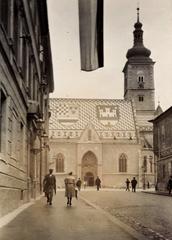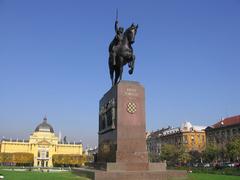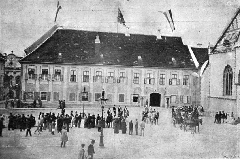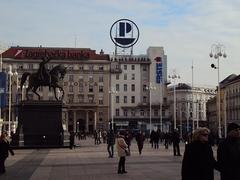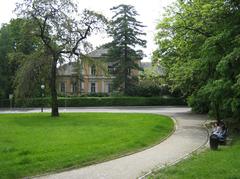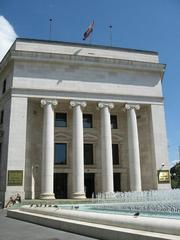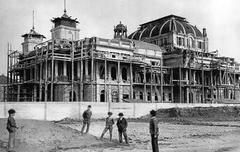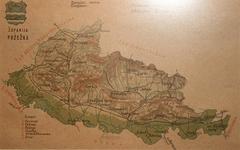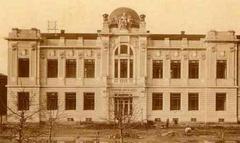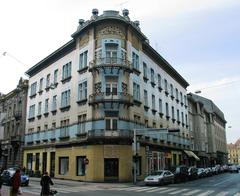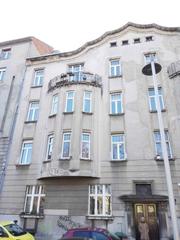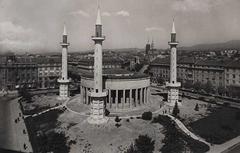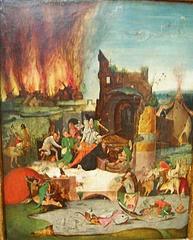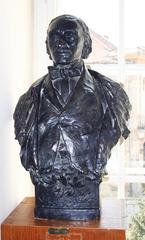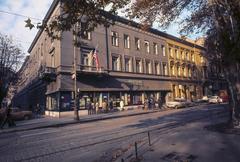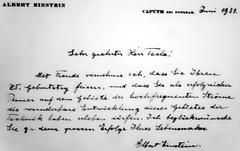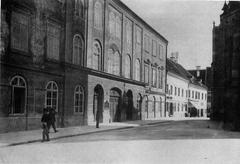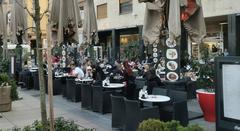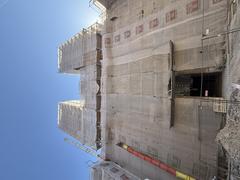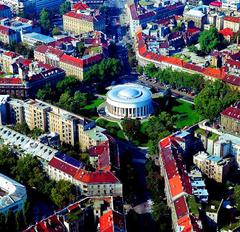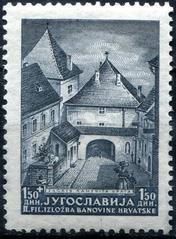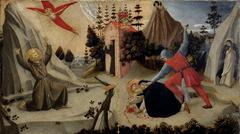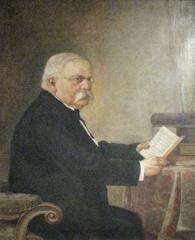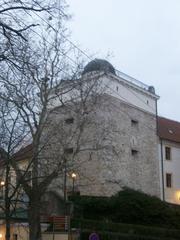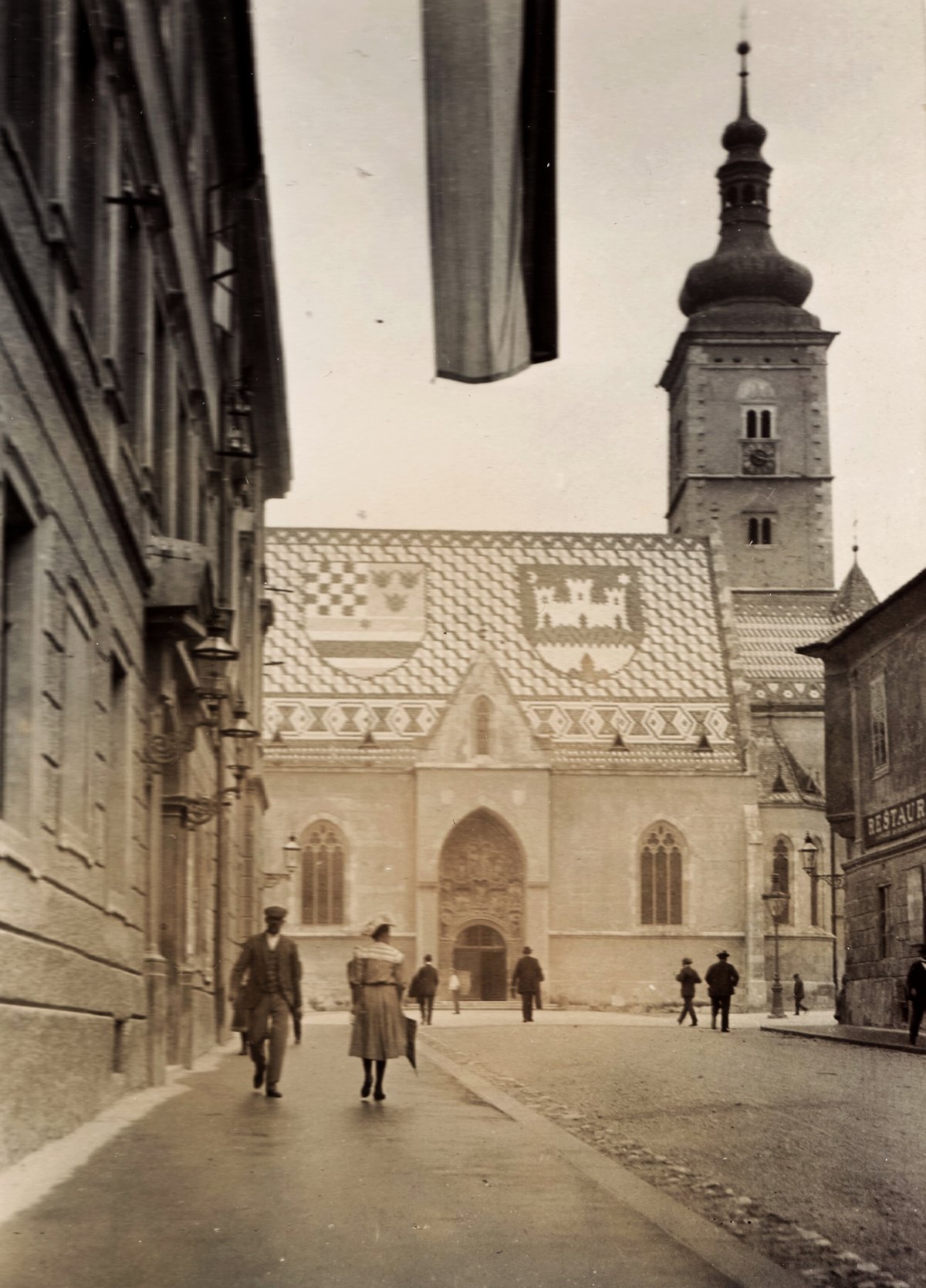
St. Mark’s Church Zagreb: Visiting Hours, Tickets, and Historical Significance
Date: 14/06/2025
Introduction
St. Mark’s Church, located in the heart of Zagreb’s Upper Town (Gornji Grad), is one of Croatia’s most revered landmarks. Famed for its strikingly colorful tiled roof and its blend of Romanesque, Gothic, and 19th-century architectural elements, the church stands as a vibrant symbol of Croatian heritage, national identity, and resilience. Situated on St. Mark’s Square—adjacent to the Croatian Parliament and Banski dvori (Government Palace)—the church is not only an artistic and historical treasure but also a central stage for state ceremonies and civic life.
This guide provides a comprehensive overview of St. Mark’s Church, covering its rich history, architectural highlights, visiting hours, ticketing details, accessibility, and insider tips for making the most of your visit. For official updates and further resources, consult the official Zagreb tourist website and trusted travel guides (Amazing Croatia; Visit Croatia).
Table of Contents
- History and Architectural Evolution
- The Iconic Tiled Roof
- The South Portal: A Gothic Masterpiece
- Interior Artwork and Decoration
- Cultural and Political Significance
- Visiting St. Mark’s Church: Hours, Tickets, and Accessibility
- Travel Tips and Nearby Attractions
- Frequently Asked Questions (FAQs)
- Summary and Visitor Recommendations
- References and Further Reading
History and Architectural Evolution
Medieval Foundations
St. Mark’s Church traces its origins to the 13th century, with initial construction on the foundations of an earlier Romanesque chapel. The earliest visible element is a Romanesque window on the south facade, a testament to the church’s ancient roots. In the 14th century, the church underwent a significant Gothic transformation, adopting a three-nave layout supported by robust columns and ribbed vaults, which continue to define the interior’s solemn grandeur (Wikipedia; InfoZagreb).
19th-Century Restoration
After the 1880 earthquake, Viennese architect Friedrich von Schmidt and Hermann Bollé led a major restoration. This phase introduced the church’s most recognizable feature—the polychrome tiled roof—and involved the lowering of the church floor and the relocation of tombs. The restoration replaced Baroque altars with elegant stone ones, blending historic reverence with contemporary design sensibilities (Visit Croatia).
The Iconic Tiled Roof
The tiled roof, completed in 1880, is one of the most photographed and distinctive features in Zagreb. Its vibrant ceramic tiles form two large coats of arms: the medieval arms of Croatia, Dalmatia, and Slavonia on one side, and the emblem of Zagreb on the other (Croatia Week; Destination.com). This bold design embodies national unity, visually uniting Croatia’s regions with its capital and serving as a living testament to the country’s enduring spirit (Visit Croatia).
Visuals: Include a high-resolution image of the roof (alt=“St. Mark’s Church Zagreb tiled roof”).
The South Portal: A Gothic Masterpiece
The church’s south portal, crafted in the late 14th century by the renowned Parler family workshop from Prague, is a masterpiece of Gothic sculpture. It features 15 finely detailed figures in shallow niches, including the Twelve Apostles and other biblical characters—an exceptional work of medieval craftsmanship (InfoZagreb; Wikipedia). The expressive faces and intricate drapery offer a unique glimpse into the artistry and religious sensibilities of the era (Amazing Croatia).
Visuals: Add a close-up image (alt=“Gothic south portal of St. Mark’s Church Zagreb”).
Interior Artwork and Decoration
Inside, St. Mark’s Church blends its Gothic heritage with later artistic interventions. The nave and chapels are adorned with frescoes and sculptures by prominent Croatian artists, notably Ivan Meštrović and Jozo Kljaković (Amazing Croatia). Stained glass windows, intricate woodwork, and stone altars reflect centuries of evolving religious and artistic traditions (Moments Log).
Cultural and Political Significance
St. Mark’s Church is deeply embedded in Croatia’s national consciousness. The coats of arms on its roof symbolize the unity of the Triune Kingdom and the city of Zagreb, while the church itself has witnessed pivotal moments in Croatian statehood, from royal ceremonies to the signing of historic documents (Moments Log; Absolute Croatia). The church’s location in St. Mark’s Square, flanked by government buildings, cements its ongoing role as both a spiritual and civic landmark (Humbo).
Venue for State Ceremonies
St. Mark’s Church serves as a venue for presidential inaugurations, state funerals, and other official events, reinforcing its place at the heart of the nation’s major milestones (Glas Hrvatske). The recent restoration after the 2020 earthquakes, celebrated by government and church officials, exemplifies the church’s resilience and enduring importance.
Visiting St. Mark’s Church: Hours, Tickets, and Accessibility
Opening Hours
- General: Typically open from 9:00 AM to 5:00 PM daily, but hours may vary due to services and official events (Humbo).
- Mass Times: Interior access is usually available during Mass—6:00 PM weekdays, 11:00 AM and 6:00 PM on Sundays and religious holidays (Destination.com).
- Special Events: Hours may change on religious holidays and state occasions. Always check the official website or inquire locally for updates.
Tickets and Entry
- Admission: Free of charge; donations are encouraged to support maintenance.
- Guided Tours: Available through local operators or the Zagreb Tourist Board, often for a nominal fee. Advance booking is recommended for groups or special-interest tours.
Accessibility
- Wheelchair Access: The main square is accessible, and the church provides ramps and assistance where possible. Some interior areas may be less accessible due to historic features.
- Strollers & Families: St. Mark’s Square is stroller-friendly, but some surrounding streets are steep and cobblestoned.
Travel Tips and Nearby Attractions
Best Time to Visit
- Photography: Early mornings or late afternoons provide optimal lighting and fewer crowds, ideal for capturing the colorful roof and Gothic portal.
- Changing of the Guard: From late April to October, witness the ceremonial changing of the guard by the Cravat Regiment at noon on weekends and public holidays.
Getting There
- By Foot: A short walk from Ban Jelačić Square, using the Stone Gate or the Zagreb Funicular for easier access from the Lower Town.
- By Public Transport: Although trams do not run through Upper Town, stops in Lower Town are within a 10-minute walk.
Nearby Attractions
- Lotrščak Tower: Offers panoramic views and the daily noon cannon firing.
- Stone Gate: A medieval city gate and pilgrimage site.
- Museum of Broken Relationships: One of Zagreb’s most unique and popular museums.
- Croatian Parliament and Government Palace: Integral to understanding Croatia’s political landscape.
Frequently Asked Questions (FAQs)
Q: What are St. Mark’s Church visiting hours?
A: Generally open 9:00 AM–5:00 PM, but hours may vary. Check the official website for current times.
Q: Do I need a ticket to enter?
A: No, entry is free; donations are appreciated. Guided tours may have a fee.
Q: Is St. Mark’s Church wheelchair accessible?
A: The main square is accessible, and ramps are provided where possible. Some interior areas may be challenging due to the historic structure.
Q: Can I take photos inside?
A: Photography is permitted outside. Inside, restrictions may apply during services—ask staff for guidance.
Q: Are guided tours available?
A: Yes, through local operators and the tourist office.
Q: What else should I see nearby?
A: Lotrščak Tower, Stone Gate, Museum of Broken Relationships, and the Croatian Parliament.
Summary and Visitor Recommendations
St. Mark’s Church is not only a masterpiece of medieval and Gothic architecture but also a vibrant emblem of Croatian unity and resilience. Its colorful tiled roof, intricate south portal, and richly decorated interior captivate visitors, while its central role in civic and religious life makes it an essential stop for anyone exploring Zagreb.
Plan to visit during open hours, respect local customs and service times, and take time to enjoy the surrounding Upper Town’s cultural sites. Enhance your visit with a guided tour or by downloading the Audiala app for an immersive audio experience.
For up-to-date visiting information, refer to the official Zagreb tourist website, and consult resources such as Humbo and Glas Hrvatske for further insights.
References and Further Reading
- St. Mark’s Church: A Mosaic of History and Art in the Heart of Zagreb (Amazing Croatia)
- Spotlight on St. Mark’s Church Zagreb (Visit Croatia)
- St. Mark’s Church Overview (InfoZagreb)
- St. Mark’s Church and Croatian Identity (Humbo)
- Zagreb’s Iconic St. Mark’s Church Reopens to Worshippers (Glas Hrvatske)
- The Story of St. Mark’s Church’s Colourful Roof in Zagreb (Croatia Week)
- Zagreb Places to Visit: What to See and Do (Destination.com)
